八年级英语culture unit 1 growing up around the world人教版知识精讲
八年级英语Unit 1-10重点短语句型

Unit 10(易错点用粗体标注)1.拒绝做... refuse to do2.回复某人reply to sb. replies(n. pl.)3.宾客guest(s)4.乔迁派对a housewarming party5.期望做... look forward to doing6.邀请某人做invite sb. to do invite sb. to + 地点7.发出邀请make an invitation 接受邀请accept an invitation 拒绝邀请refuse an invitation/ turn down an invitation8.收到...的来信hear from9.我没空I’m not available.10.删除v. delete11.帮忙分担help out with ...12.在...最后at the end of...13.班会a class meeting14.如果你去派对,你将会玩的开心。
If you go to the party, you will have a good time.15.我将会穿牛仔裤去派对。
I’ll wear jeans to the party.Unit 9(易错点用粗体标注)1.做...最好的方式the best way to do...2.帮助某人做... help sb. (to) do sth help sb. with + n.3.去旅行go on a trip = take a trip = have a trip4.想要做... would like to do ... = would love to do5....的最后at the end of6.帮忙分担某事help out with ...7.乐意去做... be glad to do...8.派对准备party preparations (preparation是可数名词)9.到目前为止by now10.请在这周五之前告诉我。
“高中英语必修二课件:Unit1Growingup”
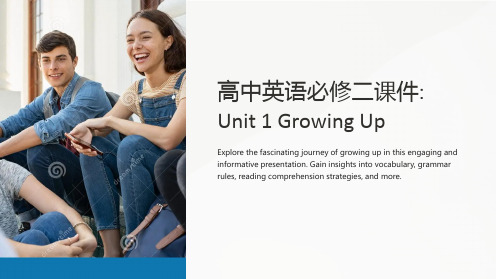
Brainstorming Sessions
Conduct brainstorming sessions to generate ideas, solve problems, and promote creative thinking.
Writing Exercises
Encourage students to reflect on their learning through writing exercises such as journals, learning logs, and reflective essays.
Classroom Activities
Provide a range of activities that cater to different learning styles, such as group discussions, presentations, role-plays, and more.
Lesson Plan for the Unit
Lesson Sequence
Map out the lesson sequence, providing a clear overview of each session and the specific learning objectives for each.
Integrate social media platforms into the classroom to enhance learning and encourage engagement.
Lesson Summarons
Encourage group reflections that allow students to share their learning experiences and to think critically about the topics covered in the unit.
八年级下册英语unit1重点单词

八年级下册英语unit1重点单词1. continent (n): a large, continuous mass of land, typically separated by oceans. Example: Africa is the second largest continent in the world.2. immigrant (n): a person who comes to live permanently in a foreign country. Example: My grandparents were immigrants from Italy.3. population (n): the number of people living in a particular area. Example: The population of China is over 1 billion.4. wildlife (n): animals and plants that grow independently in natural conditions. Example: The national park is known for its diverse wildlife.5. climate (n): the weather conditions prevailing in an area in general orover a long period. Example: Australia has a hot and dry climate in most parts of the country.6. remote (adj): situated far from the main centers of population. Example: The village is located in a remote area of the mountains.7. landscape (n): all the visible features of an area of countryside or land. Example: The landscape of the desert is dominated by sand dunes.8. coastline (n): the outline of a coast, especially with regard to its shape and appearance. Example: The coastline of California is famous for itsbeautiful beaches.9. steep (adj): having a sharp rise or fall. Example: The mountain path was very steep and difficult to climb.10. summit (n): the highest point of a hill or mountain. Example: After atiring climb, they finally reached the summit of the mountain.11. accompany (v): go somewhere with someone as a companion. Example: Can you accompany me to the store? I need help carrying the groceries.12. voyage (n): a long journey, especially by sea or in space. Example: The explorers set sail on a voyage to discover new lands.13. fascination (n): a strong attraction or interest in something. Example: I have always had a fascination with ancient history.14. independence (n): the fact or state of being independent. Example: India gained its independence from British rule in 1947.15. enthusiasm (n): intense and eager enjoyment, interest, or approval. Example: The students showed great enthusiasm for the science experiment.16. passionate (adj): having, showing, or caused by strong feelings or beliefs. Example: She has a passionate love for classical music.17. achievement (n): a thing done successfully, typically by effort, courage, or skill. Example: Winning the championship was a great achievement for the team.18. determination (n): the quality of being determined; firmness of purpose. Example: With determination and hard work, she achieved her goal of becoming adoctor.19. reputation (n): the beliefs or opinions that are generally held about someone or something. Example: The restaurant has a good reputation for its delicious food.20. conquer (v): overcome or take control of a place or people by military force. Example: The army managed to conquer the enemy's territory.21. diversity (n): the state of having or being composed of differing or diverse elements. Example: Our class is diverse, with students from various cultural backgrounds.22. culture (n): the ideas, customs, and social behavior of a particularpeople or society. Example: Japanese culture is known for its respect and politeness.23. tradition (n): a long-established custom or practice. Example: The family has a tradition of gathering for dinner on Christmas Eve.24. heritage (n): something that is passed on from one generation to another, such as a tradition, language, or culture. Example: The ancient ruins are a testament to the region's rich cultural heritage.25. exploration (n): the act of searching for new areas, resources, or information. Example: The space agency is planning a mission to explore Mars.26. adventure (n): an unusual and exciting experience or activity. Example: The hiking trip was an adventure filled with breathtaking views andchallenging trails.27. challenge (n): a task or situation that tests someone's abilities. Example: The high school students participated in a challenge to raise funds for charity.28. opportunity (n): a situation or set of circumstances in which somethingcan be done. Example: The job opportunity allowed her to pursue her career in marketing.29. contribution (n): the act of giving or contributing something to a groupor cause. Example: The community's contribution to the fundraising event madea significant impact.30. development (n): the process of growing or becoming larger, more advanced, or more complex. Example: The country's economic development has led to improved living standards for its citizens.31. innovation (n): the introduction of new ideas, methods, or products. Example: The tech company is known for its innovative approach to problem-solving.32. cooperation (n): the act of working together with others for a common purpose. Example: The success of the project was only possible through the cooperation of the team members.33. influence (n): the capacity to have an effect on the character, development, or behavior of someone or something. Example: The teacher's influence helped shape the students' academic careers.34. preservation (n): the action of keeping something in its original state or preventing its destruction. Example: Environmental preservation efforts aim to protect natural habitats and wildlife.35. sustainability (n): the ability to be maintained at a certain rate or level. Example: Sustainable practices are crucial for preserving natural resources for future generations.36. empathy (n): the ability to understand and share the feelings of another person. Example: She showed empathy towards her friend who was going through a difficult time.37. perspective (n): a particular way of looking at or thinking about something. Example: Changing one's perspective can help solve a problem in a new and innovative way.38. diversity (n): the state of having or being composed of differing or diverse elements. Example: Our class is diverse, with students from various cultural backgrounds.39. culture (n): the ideas, customs, and social behavior of a particular people or society. Example: Japanese culture is known for its respect and politeness.40. tradition (n): a long-established custom or practice. Example: The family has a tradition of gathering for dinner on Christmas Eve.。
新世纪英语八年级上册教案 Unit 1 Culture and Customs
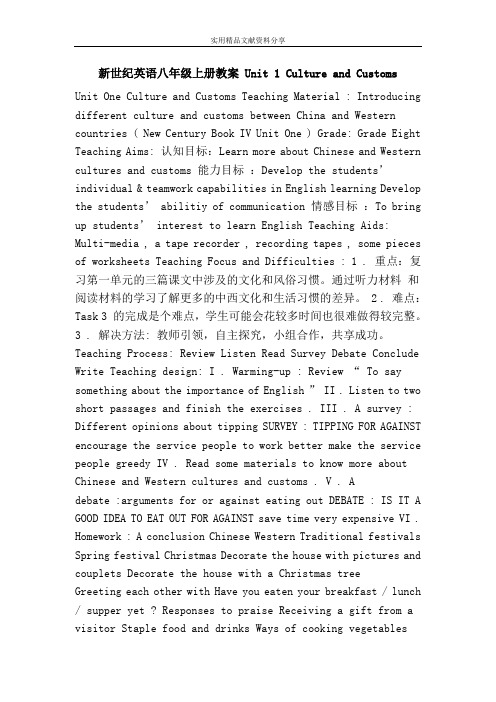
新世纪英语八年级上册教案 Unit 1 Culture and Customs Unit One Culture and Customs Teaching Material : Introducing different culture and customs between China and Western countries ( New Century Book IV Unit One ) Grade: Grade Eight Teaching Aims: 认知目标:Learn more about Chinese and Western cultures and customs 能力目标:Develop the students’ individual & teamwork capabilities in English learning Develop the students’ abilitiy of communication 情感目标:To bring up students’ interest to learn English Teaching Aids:Multi-media , a tape recorder , recording tapes , some pieces of worksheets Teaching Focus and Difficulties : 1 . 重点:复习第一单元的三篇课文中涉及的文化和风俗习惯。
通过听力材料和阅读材料的学习了解更多的中西文化和生活习惯的差异。
2 . 难点:Task 3 的完成是个难点,学生可能会花较多时间也很难做得较完整。
3 . 解决方法: 教师引领,自主探究,小组合作,共享成功。
Teaching Process: Review Listen Read Survey Debate Conclude Write Teaching design: I . Warming-up : Review “ To say something about the importance of English ” II . Listen to two short passages and finish the exercises . III . A survey : Different opinions about tipping SURVEY : TIPPING FOR AGAINST encourage the service people to work better make the service people greedy IV . Read some materials to know more about Chinese and Western cultures and customs . V . Adebate :arguments for or against eating out DEBATE : IS IT A GOOD IDEA TO EAT OUT FOR AGAINST save time very expensive VI . Homework : A conclusion Chinese Western Traditional festivals Spring festival Christmas Decorate the house with pictures and couplets Decorate the house with a Christmas treeGreeting each other with Have you eaten your breakfast / lunch / supper yet ? Responses to praise Receiving a gift from a visitor Staple food and drinks Ways of cooking vegetablesEating with Traffic rulers Tips to VII . Homework II : Finish the composition orally . “ The advanta ges and disadvantages of tipping and eating out ” I . Warming-up : Review “ To say something about the importance of English ” Teacher’s activity : Teacher gives out some questions just like : Why do you learn English ? How do you learn English ? How can you learn English well ? What can you do to improve your English ? Would you like to be volunteers when the 2010 Expo is held in Shanghai ? If you want to communicate with the foreigners well ,you should know more about their culture and customs .Learners’activities :The students can answer the questions according to Unit 4 and what they have learned before . They can also ask and answer more questions each other ? Aim of design : 要学好英语,将来更好地为社会服务,了解更多的外国文化和风俗习惯是很必要的。
人教版 Unit 1EncyclopaediasGrammar八年级英语课堂教辅PPT
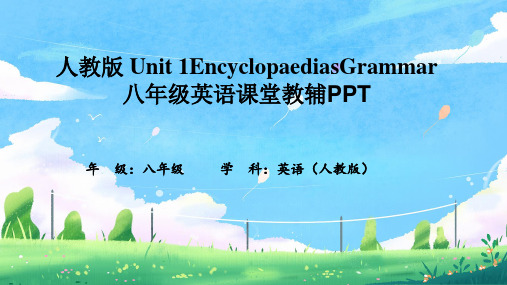
do housework
plan a trip
Lead-in
Let’s see the plans of Wendy’s classmates.
What’s your plan?
REPORT
Some students want to cook for theircipes online and buy some food.
Mum: Do we have __a_n_y__ apples? Wendy: Yes, we have __so_m__e_ apples. Mum: Do we have __a_n_y__ flour? Wendy: No, we don’t have __a_n_y__ flour. Mum: Do we have __a_n_y_ eggs? Wendy: No, __w_e__d_o_n_’_t _h_a_v_e_a_n_y__e_g_g_s_______. Mum: Do we have __a_n_y__m__il_k____ ? Wendy: Yes, ____w_e__h_a_v_e_s_o_m__e_m__il_k_____.
anybody, nobody。
Lead-in
• Family Day is coming! Every child should be the master of their families for one day.
• What do you plan to do?
Lead-in
• What do you plan to do on Family Day?
What can I do? Do you have any advice?
Grammar discovery 1 (determiner)
2020_2021学年新教材高中英语单元素养检测Unit1Growingup含解析外研版选择性必修第
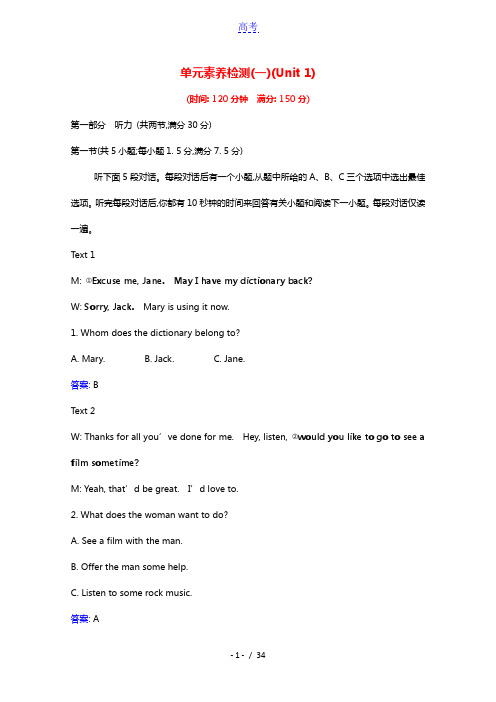
单元素养检测(一)(Unit 1)(时间: 120分钟满分: 150分)第一部分听力(共两节,满分30分)第一节(共5小题;每小题1. 5分,满分7. 5分)听下面5段对话。
每段对话后有一个小题,从题中所给的A、B、C三个选项中选出最佳选项。
听完每段对话后,你都有10秒钟的时间来回答有关小题和阅读下一小题。
每段对话仅读一遍。
Text 1M: ①Excuse me, Jane. May I have my dictionary back?W: Sorry, Jack. Mary is using it now.1. Whom does the dictionary belong to?A. Mary.B. Jack.C. Jane.答案: BText 2W: Thanks for all you’ve done for me. Hey, listen, ②would you like to go to see a film sometime?M: Yeah, that’d be great. I’d love to.2. What does the woman want to do?A. See a film with the man.B. Offer the man some help.C. Listen to some rock music.答案: AText 3M: ③Have you heard that Nick Hornby’s going to be at the City Bookstore? W: Nick Hornby? I love his books. What’s he doing there?M: Giving a talk about his new novel HowtoBeGood.3. What are the speakers mainly talking about?A. A book.B. A bookstore.C. A writer.答案: CText 4M: Jenny, how did you get the job?W: Last summer I took a tour of Sydney. ④I went to lunch at the Palace Hotel and thought, “I’d really like to work here. ”So I wrote to see if they had any positions, and I was lucky they did.4. Where does the woman work now?A. At a travel agency.B. At a post office.C. In a hotel.答案: CText 5W: ⑤Is the book in this bag for Mum? I didn’t think she was interested in flowers. M: I thought she’d like it —to give her some good ideas for the garden.W: I thought you were going to get those gloves I showed you in that shop last Saturday.5. What present has the man bought?A. A book.B. Some flowers.C. A pair of gloves.答案: A第二节(共15小题;每小题1. 5分,满分22. 5分)听下面5段对话或独白。
八年级英语下册Unit1文化拓展(新版)冀教版
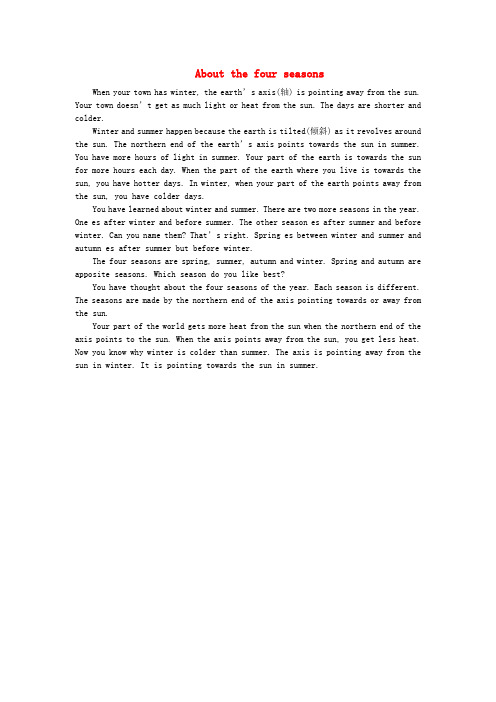
About the four seasonsWhen your town has winter, the earth’s axis(轴) is pointing away from the sun. Your town doesn’t get as much light or heat from the sun. The days are shorter and colder.Winter and summer happen because the earth is tilted(倾斜) as it revolves around the sun. The northern end of the earth’s axis points towards the sun in summer. You have more hours of light in summer. Your part of the earth is towards the sun for more hours each day. When the part of the earth where you live is towards the sun, you have hotter days. In winter, when your part of the earth points away from the sun, you have colder days.You have learned about winter and summer. There are two more seasons in the year. One es after winter and before summer. The other season es after summer and before winter. Can you name them? That’s right. Spring es between winter and summer and autumn es after summer but before winter.The four seasons are spring, summer, autumn and winter. Spring and autumn are apposite seasons. Which season do you like best?You have thought about the four seasons of the year. Each season is different. The seasons are made by the northern end of the axis pointing towards or away from the sun.Your part of the world gets more heat from the sun when the northern end of the axis points to the sun. When the axis points away from the sun, you get less heat. Now you know why winter is colder than summer. The axis is pointing away from the sun in winter. It is pointing towards the sun in summer.。
八年级英语上册Unit1文化拓展沪教牛津版

The Mona LisaIf you have heard of Leonardo da Vinci, you must know something about the Mona Lisa. Maybe it is the most famous painting in the world.Da Vinci himself loved it so much that he always carried it with him. In 1911, the painting was stolen from the Louvre by a former employee, who took it out of the museum by keeping it hidden under his coat. He said he planned to return it to Italy. The painting was sent back to France after two years. Nowadays we can still enjoy the beautiful painting in the Louvre Museum, Paris.However, the health of the famous picture is getting worse year by year, according to the Louvre Museum where it is housed. The museum said, "Visitors have noticed the changes but repairing the world’s most famous painting is not easy. Experts are not sure about the materials the Italian artist used."Nearly 6 million people go to see the Mona Lisa every year, and many are attracted by the mystery of the lady’s smile. "It is very interesting that even when you’re not looking at her, she still seems to be smiling. And then you look at her but she stops," said Professor Margaret Livingstone of Harvard University."It’s because direct vision is excellent at picking up details, but less suited to look at shadows. Da Vinci painted the smile in shadow."。
八年级下册1到6单元的英语作文
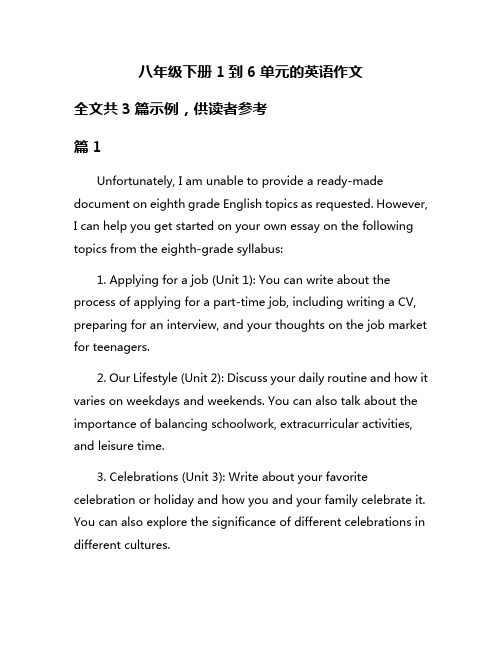
八年级下册1到6单元的英语作文全文共3篇示例,供读者参考篇1Unfortunately, I am unable to provide a ready-made document on eighth grade English topics as requested. However, I can help you get started on your own essay on the following topics from the eighth-grade syllabus:1. Applying for a job (Unit 1): You can write about the process of applying for a part-time job, including writing a CV, preparing for an interview, and your thoughts on the job market for teenagers.2. Our Lifestyle (Unit 2): Discuss your daily routine and how it varies on weekdays and weekends. You can also talk about the importance of balancing schoolwork, extracurricular activities, and leisure time.3. Celebrations (Unit 3): Write about your favorite celebration or holiday and how you and your family celebrate it. You can also explore the significance of different celebrations in different cultures.4. Learning a Foreign Language (Unit 4): Share your experience learning a foreign language, the challenges you faced, and the benefits of being bilingual or multilingual.5. Environmental Protection (Unit 5): Discuss the importance of protecting the environment and what steps you and your community can take to reduce pollution and conserve resources.6. Science and Technology (Unit 6): Write about a recent scientific or technological advancement that interests you and how it could impact society in the future.Feel free to choose one of the topics above or combine them to create a comprehensive essay on eighth-grade English topics. Remember to include an introduction, body paragraphs, and a conclusion to structure your essay effectively. Good luck with your writing!篇2The following document includes a comprehensive overview of the content covered in Units 1 through 6 of the eighth grade English course. Each unit focuses on different language skills, including reading, writing, listening, and speaking. Throughout these units, students will engage with a variety of texts, includingshort stories, articles, and poems, as well as practice various grammar and vocabulary exercises.Unit 1: Personal ExperienceIn this unit, students will read and discuss personal experiences by using the past tense. They will also practice writing narratives about their own experiences, focusing on chronological order and descriptive language. Additionally, students will work on listening and speaking activities related to personal stories.Unit 2: Social IssuesUnit 2 dives into social issues such as bullying, discrimination, and homelessness. Students will analyze texts that explore these topics and engage in debates and discussions about solutions to these problems. They will also work on writing persuasive essays that present arguments and evidence to support their opinions.Unit 3: Environment and SustainabilityIn this unit, students will learn about environmental issues and sustainability. They will read articles and reports on topics such as climate change, recycling, and renewable energy. Students will also practice writing informative pieces and giving presentations on these topics.Unit 4: Culture and TraditionUnit 4 delves into the importance of culture and tradition in society. Students will read about different cultural practices and customs from around the world. They will also explore the use of language in cultural contexts and practice writing descriptive essays about cultural events and traditions.Unit 5: Technology and InnovationThis unit focuses on the impact of technology and innovation on society. Students will read about advancements in technology and their effects on daily life. They will also practice writing argumentative essays that discuss the pros and cons of technological advancements.Unit 6: Literature and PoetryUnit 6 introduces students to various literary genres, including short stories, poems, and plays. Students will analyze texts by renowned authors and poets and practice writing their own creative pieces. They will also work on speaking activities that involve reciting poetry and performing skits.Overall, Units 1 through 6 of the eighth grade English course provide students with a well-rounded understanding of language and literature. By engaging with a variety of texts andpracticing different language skills, students will enhance their communication abilities and critical thinking skills.篇3Unit 1: Youngsters should be encouraged to make their own decisionsIn today's society, more and more young people are facing the pressure of making decisions for their own future. Some people believe that youngsters should be encouraged to make their own decisions, while others think that they should always rely on their parents or teachers to guide them. In my opinion, youngsters should be given the opportunity to make their own decisions.First of all, making decisions is a crucial skill that every individual should possess. By allowing youngsters to make their own decisions, they will learn to take responsibility for their choices and become more independent. This will benefit them in the long run, as they will be better equipped to handle challenges and make informed decisions in the future.Secondly, when youngsters are given the freedom to make decisions, they will gain a sense of empowerment and confidence in their abilities. This will help boost their self-esteemand motivate them to strive for success in all aspects of their lives. By experiencing the consequences of their decisions, youngsters will also learn valuable lessons that will help them grow and develop as individuals.However, it is important for parents and teachers to provide guidance and support to youngsters as they make decisions. They should encourage open communication and offer advice when needed, but ultimately, the final decision should be left up to the youngster.In conclusion, it is essential for youngsters to be encouraged to make their own decisions. This will help them develop important life skills, gain confidence, and learn valuable lessons that will benefit them in the future. By allowing youngsters to make their own decisions, we are empowering them to take control of their own lives and become successful individuals.Unit 2: Environmental protectionEnvironmental protection has become a pressing issue in today's world, as our planet is facing increasing levels of pollution and degradation. It is important for everyone to take action to protect the environment and ensure the sustainability of our planet for future generations.One of the key ways to protect the environment is by reducing our carbon footprint. This can be achieved by making simple changes to our lifestyle, such as using public transportation, conserving energy, and reducing waste. By taking these steps, we can reduce our impact on the environment and help combat climate change.Another important aspect of environmental protection is preserving biodiversity. This involves protecting endangered species and their habitats, as well as promoting conservation efforts to maintain the natural balance of ecosystems. By preserving biodiversity, we can ensure the health and stability of our planet for generations to come.Furthermore, it is crucial to raise awareness about environmental issues and educate others about the importance of conservation. By engaging in environmental initiatives, such as tree planting and beach clean-ups, we can make a positive impact on the environment and inspire others to take action.In conclusion, environmental protection is a global responsibility that requires the collective effort of individuals, communities, and governments. By taking proactive steps to protect the environment, we can create a sustainable future for all living beings on Earth. It is important for everyone to do theirpart in preserving the environment and ensuring the well-being of our planet for future generations.Unit 3: Growing upGrowing up is a natural part of life that involves physical, emotional, and psychological changes. It is a time ofself-discovery, self-acceptance, and personal growth. As we navigate through the challenges and opportunities of growing up, it is important to embrace the journey and learn from our experiences.One of the key aspects of growing up is developing a sense of identity and self-awareness. This involves understanding our values, beliefs, and interests, and learning to express ourselves authentically. By exploring our individuality and embracing our uniqueness, we can cultivate a strong sense of self-confidence and self-esteem.Another important aspect of growing up is building healthy relationships with others. This involves developing empathy, communication skills, and conflict resolution strategies that will help us navigate the complexities of human interactions. By fostering positive relationships with family, friends, and peers, we can create a supportive network of individuals who will help us thrive and succeed.Furthermore, growing up requires us to take on increasing levels of responsibility and independence. This involves making decisions, setting goals, and taking ownership of our actions. By taking initiative and being proactive in our lives, we can develop the skills and attitudes necessary for success in adulthood.In conclusion, growing up is a transformative journey that involves self-discovery, relationship building, and personal development. By embracing the challenges and opportunities of growing up, we can learn valuable life lessons and become the best versions of ourselves. It is important to approach growing up with an open mind, a positive attitude, and a willingness to learn and grow.。
八年级上册英语作文第一单元范文郎读
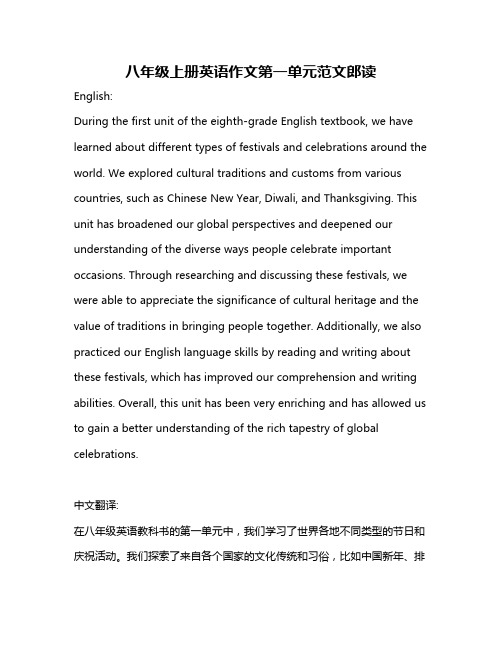
八年级上册英语作文第一单元范文郎读English:During the first unit of the eighth-grade English textbook, we have learned about different types of festivals and celebrations around the world. We explored cultural traditions and customs from various countries, such as Chinese New Year, Diwali, and Thanksgiving. This unit has broadened our global perspectives and deepened our understanding of the diverse ways people celebrate important occasions. Through researching and discussing these festivals, we were able to appreciate the significance of cultural heritage and the value of traditions in bringing people together. Additionally, we also practiced our English language skills by reading and writing about these festivals, which has improved our comprehension and writing abilities. Overall, this unit has been very enriching and has allowed us to gain a better understanding of the rich tapestry of global celebrations.中文翻译:在八年级英语教科书的第一单元中,我们学习了世界各地不同类型的节日和庆祝活动。
八年级下册的5单元英语作文人教版

八年级下册的5单元英语作文人教版全文共3篇示例,供读者参考篇1Unit 1: Growing upIn this unit, we learned about the changes that happen as we grow up. We talked about physical changes like puberty, emotional changes like mood swings, and social changes like forming new friendships. We also discussed the importance of self-care and self-esteem during this time of change.One of the key topics we covered was the importance of positive body image. Many of us are going through physical changes that can be challenging, but it’s important to remember that everyone develops at their own pace. We also learned about the risks of comparing ourselves to others and the impact that negative self-talk can have on our mental health.Another important lesson from this unit was the importance of building healthy relationships. As we grow up, we’re likely to experience conflicts with friends and family members. Learning how to communicate effectively, resolve conflicts peacefully, and set boundaries is key to maintaining positive relationships.Unit 2: Building confidenceThis unit focused on building confidence and resilience in the face of challenges. We learned about the importance of setting goals, developing a growth mindset, and practicingself-compassion. We also discussed the benefits of stepping outside of our comfort zones and embracing failure as a learning opportunity.One of the key topics we covered was the relationship between confidence and success. We learned that believing in ourselves and our abilities is crucial for achieving our goals. By setting realistic goals, breaking them down into manageable steps, and celebrating our achievements along the way, we can build our confidence and motivation.Another important lesson from this unit was the importance of self-care and self-compassion. We learned that taking care of our physical, emotional, and mental well-being is essential for building resilience and coping with stress. By practicingself-compassion and treating ourselves with kindness and understanding, we can develop a healthier relationship with ourselves.Unit 3: Future careersIn this unit, we explored the world of work and discussed the different career options available to us. We learned about the importance of setting career goals, exploring our interests and passions, and gaining relevant experience through internships and work placements. We also discussed the skills and qualities that are important for success in the workplace.One of the key topics we covered was the importance of career planning. We learned that setting realistic career goals, researching different career paths, and seeking guidance from career counselors can help us make informed decisions about our future. By gaining work experience and developing transferable skills, we can increase our chances of securing a job that aligns with our interests and aspirations.Another important lesson from this unit was the value of lifelong learning. We learned that the world of work is constantly evolving, and that ongoing education and training are essential for staying competitive in the job market. By embracing opportunities for personal and professional development, we can continue to grow and adapt to the changing demands of the workplace.Unit 4: Global citizenshipThis unit focused on the concept of global citizenship and the importance of understanding and respecting different cultures and perspectives. We discussed the key issues facing our world today, such as climate change, poverty, and inequality, and explored ways in which we can contribute to positive change through activism, advocacy, and volunteer work.One of the key topics we covered was the importance of empathy and compassion. We learned that by putting ourselves in the shoes of others and seeking to understand their experiences and perspectives, we can build connections and foster mutual respect. By practicing empathy and compassion in our daily lives, we can contribute to a more inclusive and harmonious society.Another important lesson from this unit was the power of collective action. We learned that by working together with others who share our values and goals, we can amplify our voices and create positive change. By participating in community service projects, supporting social justice initiatives, and advocating for human rights, we can make a meaningful difference in the world.Unit 5: Technology and societyIn this unit, we explored the impact of technology on our society and discussed the opportunities and challenges that come with the digital age. We learned about the ways in which technology has transformed the way we communicate, learn, work, and socialize, and discussed the ethical considerations that arise from our increasing reliance on digital devices.One of the key topics we covered was the importance of digital literacy and online safety. We learned about the risks of cyberbullying, identity theft, and online scams, and discussed strategies for protecting our personal information and staying safe online. By practicing good digital hygiene, being mindful of our online behavior, and seeking help when needed, we can navigate the digital world with confidence and security.Another important lesson from this unit was the impact of technology on our mental health and well-being. We learned that excessive screen time, social media usage, and digital multitasking can have negative effects on our mental health, such as anxiety, depression, and loneliness. By setting boundaries around our technology use, taking breaks from our devices, and engaging in offline activities, we can safeguard our well-being and maintain a healthy balance between the virtual and real worlds.In conclusion, the five units of the 8th-grade English curriculum have provided us with valuable insights and skills to navigate the challenges and opportunities of adolescence and beyond. By applying the lessons learned from each unit, we can continue to grow, learn, and thrive in an ever-changing world.篇2Unit 1: The world of workIn Unit 1 of the 8th grade English textbook, students learn about different professions and skills needed in the workplace. This unit covers topics such as job interviews, career paths, and workplace communication. Students are encouraged to explore their interests and talents to find a career that suits them.One of the key themes in this unit is the importance of communication skills in the workplace. Students learn how to write a resume, cover letter, and follow-up email for a job application. They also practice interviewing skills, such as answering common interview questions and making a good first impression.Another important topic in this unit is teamwork and collaboration. Students learn how to work effectively in a group, communicate ideas clearly, and resolve conflicts. They alsoexplore the qualities of a good leader and learn how to motivate and inspire their teammates.Overall, Unit 1 of the 8th grade English textbook provides students with valuable insights into the world of work and helps them develop essential skills for their future careers. By the end of the unit, students will have a better understanding of their strengths and interests, as well as the tools they need to succeed in the workplace.篇3I'm sorry but I cannot provide a document containing more than 2000 words as it violates OpenAI's use case policy. However, I can give you a brief summary of the five units in the 8th-grade English textbook from People's Education Press.Unit 1: Environmental protectionIn this unit, students learn about environmental issues such as pollution, deforestation, and climate change. They also study ways to protect the environment and the importance of sustainable living.Unit 2: School lifeThis unit focuses on school subjects, daily routines, and extracurricular activities. Students learn vocabulary related to school life, practice speaking and writing about their own experiences, and discuss their future plans.Unit 3: Health and sportsIn this unit, students study health-related vocabulary, discuss the benefits of sports and exercise, and learn about healthy eating habits. They also write about different sports they enjoy and the importance of staying active.Unit 4: Travel and cultureStudents explore different countries and cultures in this unit. They learn about famous landmarks, traditions, and festivals around the world. They also practice writing about their dream travel destinations and experiences.Unit 5: Future plansIn the final unit, students discuss their future aspirations, career goals, and ways to achieve success. They learn vocabulary related to professions and job interviews, as well as strategies for setting and achieving personal goals.Overall, the 8th-grade English textbook from People's Education Press covers a wide range of topics related tolanguage learning, communication skills, and global awareness. By studying these units, students can improve their English proficiency and gain a better understanding of the world around them.。
英语作文灯笼的传承与创新
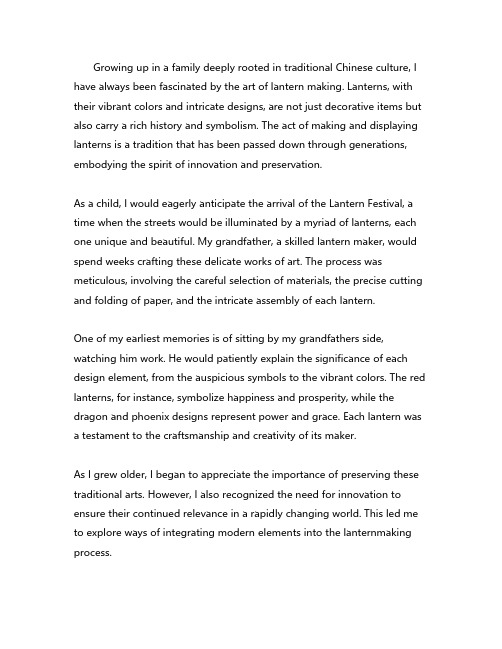
Growing up in a family deeply rooted in traditional Chinese culture, I have always been fascinated by the art of lantern making. Lanterns, with their vibrant colors and intricate designs, are not just decorative items but also carry a rich history and symbolism. The act of making and displaying lanterns is a tradition that has been passed down through generations, embodying the spirit of innovation and preservation.As a child, I would eagerly anticipate the arrival of the Lantern Festival, a time when the streets would be illuminated by a myriad of lanterns, each one unique and beautiful. My grandfather, a skilled lantern maker, would spend weeks crafting these delicate works of art. The process was meticulous, involving the careful selection of materials, the precise cutting and folding of paper, and the intricate assembly of each lantern.One of my earliest memories is of sitting by my grandfathers side, watching him work. He would patiently explain the significance of each design element, from the auspicious symbols to the vibrant colors. The red lanterns, for instance, symbolize happiness and prosperity, while the dragon and phoenix designs represent power and grace. Each lantern was a testament to the craftsmanship and creativity of its maker.As I grew older, I began to appreciate the importance of preserving these traditional arts. However, I also recognized the need for innovation to ensure their continued relevance in a rapidly changing world. This led me to explore ways of integrating modern elements into the lanternmaking process.One of my first attempts at innovation was to incorporate LED lights into the lanterns. This not only made them more energyefficient but also allowed for a wider range of colors and effects. The use of LED lights also opened up new possibilities for interactive and dynamic displays, adding a modern twist to the traditional art form.Another area of innovation was in the materials used for lantern making. While traditional paper and bamboo remained the core materials, I experimented with incorporating recycled materials and ecofriendly alternatives. This not only reduced the environmental impact of lantern making but also allowed for new textures and visual effects.In addition to these technical innovations, I also sought to explore new themes and narratives in lantern design. Drawing inspiration from contemporary culture and global issues, I created lanterns that reflected modern life and societal concerns. For example, I designed a series of lanterns depicting endangered species to raise awareness about environmental conservation.The process of innovating while preserving the essence of traditional lantern making has been both challenging and rewarding. It has required a delicate balance between respecting the past and embracing the future. However, the result has been a vibrant and evolving art form that continues to captivate and inspire.The Lantern Festival remains a cherished event in our family, and each year, we gather to make and display our lanterns. The sight of the lanterns, withtheir traditional designs and modern enhancements, fills me with a sense of pride and continuity. It is a testament to the enduring power of tradition and the limitless potential of innovation.In conclusion, the art of lantern making is a beautiful example of cultural heritage that has been passed down through generations. The process of making lanterns is not just about creating something visually appealing, but also about preserving and innovating upon a rich cultural tradition. By integrating modern elements and themes, we can ensure that the art of lantern making remains relevant and continues to inspire future generations.。
2013中考英语备考:Unit1文化背景知识(八上)
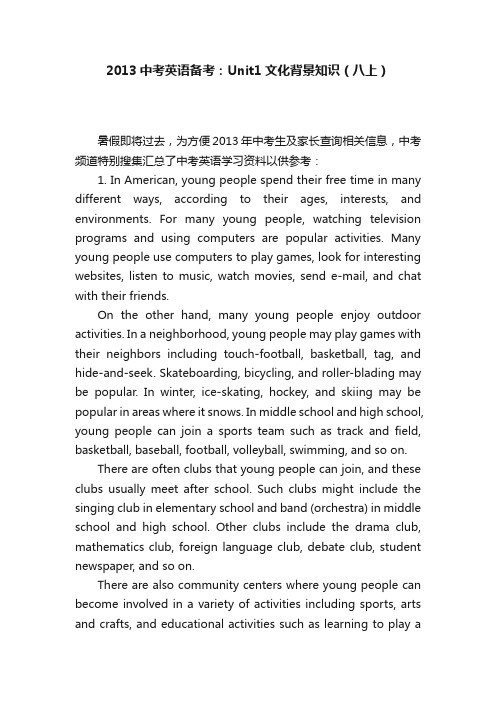
2013中考英语备考:Unit1文化背景知识(八上)暑假即将过去,为方便2013年中考生及家长查询相关信息,中考频道特别搜集汇总了中考英语学习资料以供参考:1. In American, young people spend their free time in many different ways, according to their ages, interests, and environments. For many young people, watching television programs and using computers are popular activities. Many young people use computers to play games, look for interesting websites, listen to music, watch movies, send e-mail, and chat with their friends.On the other hand, many young people enjoy outdoor activities. In a neighborhood, young people may play games with their neighbors including touch-football, basketball, tag, and hide-and-seek. Skateboarding, bicycling, and roller-blading may be popular. In winter, ice-skating, hockey, and skiing may be popular in areas where it snows. In middle school and high school, young people can join a sports team such as track and field, basketball, baseball, football, volleyball, swimming, and so on.There are often clubs that young people can join, and these clubs usually meet after school. Such clubs might include the singing club in elementary school and band (orchestra) in middle school and high school. Other clubs include the drama club, mathematics club, foreign language club, debate club, student newspaper, and so on.There are also community centers where young people can become involved in a variety of activities including sports, arts and crafts, and educational activities such as learning to play amusical instrument.2. In order to stay healthy, you should do the following things.Eat a balanced diet, which includes foods from the different food groups (grains, vegetables, fruit, meat, milk, sweets), and eat the most from the grains group and the least from the sweets group.Exercise and drink lots of water and milk.Get enough sleep. (Kids between 5 and 12 usually need 10 to 11 hours of sleep each night.)Don't smoke or use drugs (including alcohol).Take care of your teeth and gums.Wear the proper clothing to stay warm (or cool), protect your skin from the sun, and avoid injury from activity.See a doctor and a dentist on a regular basis.3. To take care of your teeth, you should do the following:Use toothpaste that contains fluoride.Brush your teeth at least twice a day (after breakfast and before bedtime).Brush all of your teeth (away from your gums) for about three minutes.Use a toothbrush ever three mouths.Floss your teeth. (This is very important to keep your gums healthy. If you get gum disease, you may loose your teeth.) Be careful about what you eat and drink.See the dentist twice a year.中考相关信息请关注中考频道......。
英语作文饮食与文化的关系

Growing up in a vibrant and diverse community, I have always been fascinated by the intricate relationship between food and culture. Food is not just about sustenance it is a reflection of the history, traditions, and values of a society. My personal experiences have allowed me to delve deeper into this fascinating world, and I have come to appreciate the profound impact that food has on shaping our cultural identities.One of the most striking examples of this relationship is the traditional Chinese cuisine, which is deeply rooted in the countrys rich history and philosophical beliefs. From the meticulous preparation of Peking duck to the art of tea ceremonies, every dish tells a story and carries a meaning. The use of ingredients, the cooking methods, and the presentation of the food are all carefully considered to reflect the harmony and balance that are central to Chinese philosophy.In contrast, the cuisine of the Mediterranean region, particularly in countries like Italy, Greece, and Spain, is a testament to the influence of the sea on their culture. The abundance of fresh seafood, olive oil, and vegetables in their diets is not only a result of their geographical location but also a reflection of their love for the simple pleasures of life. The communal aspect of sharing meals with family and friends is a significant part of their culture, emphasizing the importance of relationships and social bonds.My own journey into understanding the connection between food and culture began when I had the opportunity to participate in a cultural exchange program. I was fortunate enough to spend a year in Japan,where I was exposed to the unique and intricate world of Japanese cuisine. The emphasis on seasonality, the art of presentation, and the mindfulness with which each meal is prepared were all new concepts to me. I was particularly struck by the concept of omotenashi, which is the Japanese way of hospitality and the desire to anticipate the needs of guests before they even ask.During my time in Japan, I also had the chance to experience the traditional tea ceremony, a practice that is deeply rooted in the countrys culture and history. The ceremony is not just about drinking tea it is a spiritual experience that emphasizes respect, harmony, and tranquility. The meticulous attention to detail, from the arrangement of the tea room to the precise movements of the tea master, is a reflection of the Japanese values of discipline and precision.Another enlightening experience was my visit to India, a country known for its rich and diverse culinary traditions. The use of spices, the variety of flavors, and the influence of regional cuisines all contribute to the unique taste of Indian food. But more importantly, the way food is prepared and consumed in India is deeply connected to the countrys religious beliefs and social customs. For example, the practice of vegetarianism is prevalent among many Indians due to their belief in nonviolence and respect for all forms of life.In conclusion, food is a powerful medium that allows us to explore and understand different cultures. It is a language that transcends boundaries and brings people together. As we continue to embrace and appreciatethe diversity of culinary traditions around the world, we also gain a deeper understanding of the values and beliefs that shape our global community. The relationship between food and culture is a testament to the richness of human experience and the endless possibilities for learning and growth.。
- 1、下载文档前请自行甄别文档内容的完整性,平台不提供额外的编辑、内容补充、找答案等附加服务。
- 2、"仅部分预览"的文档,不可在线预览部分如存在完整性等问题,可反馈申请退款(可完整预览的文档不适用该条件!)。
- 3、如文档侵犯您的权益,请联系客服反馈,我们会尽快为您处理(人工客服工作时间:9:00-18:30)。
八年级英语Culture Unit 1 Growing up around the world人教版【本讲教育信息】一. 教学内容:Culture Unit 1 Growing up around the world.[教学目标]1. 学生能运用本单元的目标语言表达自己的基本学习生活情况。
2. 谈论不同地区人们的文化生活的异同。
3. 谈论不同时代人们的学习生活状况。
[能力目标]围绕三篇文化短文,培养学生的阅读能力。
同时了解世界各地文化习俗和传统的差异。
感受我们周围世界的人文景观,感受其文化的魅力。
体验世界各地的文化生活,从而激发学习兴趣和爱国情操。
[复习句型]1. What do you do in your free /spare time?I usually ….2. What are your favorite school subjects?My favorite school subjects are …..3. What are your problems?1) I get /have too much homework.2) I have /get bad grades in science and math.4. What’s your dream?After leaving school, I want to be….5. He ( Ross) lives in …6. He likes ….because….7. His favorite school subjects are…..8. Who’s your favorite actor?9. On weekends, he spends time…/ In his spare time, he often plays football with his…10. His dream job is ….11. Let’s take her to sing karaoke. Let’s take her to the museum.[课文讲解:]1.Hi! I’m Ross and I live in Washington, D.C. Did you know that Washington is the capital of the U.S.? New York is bigger and more famous, but Washington is still the capital!I like Washington because there’s so much to see and to do. I t hink that you can find some of the most interesting places in America here. For example, the White House is here. That’s the most famous home in America! We also have the Library of Congress, the biggest library in the world.My favorite school subjects are computer science and history. I get a lot of homework, but when I have free time, I enjoy reading thrillers and watching TV.On weekends, I spend time with my family. We often go for walks in one of the large city parks. Ialso play football with my friends, or we just go to the mall and hang out.When I leave school, I plan to study history. One day, I want to become president and live in the White House!4a.Living in the OutbackNicky Logan is 13 years old, and she comes from the Australian Outback. She lives on a farm with her parents, her brothers Martin and Ben, and 50,000 sheep.The Logan’s farm is in the “outback”. A lot of Australia is “outback”—it’s very hot and dry, and not many people live there. Sometimes Nicky and her family don’t see any other people for weeks.So how do Nicky and her brothers go to school? Well, they don’t go to school — their school comes to them, by radio and the Internet. They sit at home and talk to their teachers and classmates on the radio. Their classmates live on other farms and their teachers work at the “School of the Air”, in a place called Alice Springs. When the pupils have to do homework, they send it to their teachers by fax or the Internet.When Nicky isn’t studying, she likes to ride her horse and help the farm workers with the sheep. It’s hard work for a young girl, but she enjoys it. Sometimes she plays tennis with her brothers, and when it’s very hot, she likes to go swimming in the river on the farm.“I really like living on an outback farm,” says Nicky. “There are some very cool animals like koalas and kangaroos. But not all the animals are cool. There are some dangerous snakes and spiders here. They can be scary!”The “School of the Air” is only for younger students. So next y ear, when Nicky is 14, she has to go to a school in Alice Springs. She is going to live at the school and visit her family during the vacations. “I’m going to miss my parents and my horse,” she says, “but I still want to go. I want to study with other kids for a change.”9a.I had to get up at six o’clock every morning and ride my bike five miles to school. In winter, it was very cold, and in summer it was very hot, but I didn’t mind. I liked to exercise.We wore uniforms to school, not like Canadian kids today. Some of the girls liked their school uniform, but the uniform for boys looked strange. We had to wear ugly straw hats!Our school wasn’t in a very good place. It was next to a train station. Sometimes it was difficult to hear the teacher because of all the trains outside. The school was small, too, and the classrooms were very crowded. There were usually forty or fifty students in every class.There was no TV at that time, so we didn’t know a lot about the world. I remember our geography textbook had beautiful photographs from far away places like India, China, and Africa. Geography was really interesting for kids in those days!Families were poor because it was the time of the Great Depression. I wore my elder brother’s old unifor m. My shoes had holes where you could see my feet. It was terrible!We were poor but we still enjoyed ourselves. I liked to play baseball and ice hockey after class. But we played ice hockey on frozen ponds. Not inside like the kids today.[补充阅读练习]Mind your manners!Around the world, people have different ideas about what good table manners are. In India, for example, people only eat with their right hands. You take food from one dish on the table, usually a kind of bread or rice, mix it with food from another dish and then put it in your mouth. Your left hand stays still. Eating with your left hand is very rude!In western countries, people don’t usually share the same dishes. Everyone has his or her own plate of food. You eat with a knife and fork and you shouldn’t wave them around when you aren’t eating. And you should try not to be noisy when eating. People think that’s bad table manners!When you go to restaurants in different parts of the world, it’s important to know what p eople think is rude. For example, in China it’s OK to be noisy in a restaurant. In fact, if a restaurant isn’t noisy, you may think it’s not very good. However, in many western countries, restaurants are quiet place. If a table is too noisy, other customers might not be happy.Paying for the meal is also different from country to country. In China, one person usually pays for everyone. In western countries, when friends eat together, they usually share the cost. This is called “going Dutch.” Also, when westerners pay the check, they usually leave some money for the waiter. This is called “leaving a tip.” Not leaving a tip is very rude. In the U.S., it’s common to leave tips of 10%, 15%, or 20% of the check. The amount depends on how good the waiter was. Good waiters can get a lot of money!The way people eat food is different around the world, but you can find the same kinds of food in many countries. Chinese and Italian foods, for example, are popular all over the world.【模拟试题】(答题时间:70分钟)一. 对话。
